- Home
- Mons Kallentoft
Midwinter Sacrifice aka Midwinter Blood Page 2
Midwinter Sacrifice aka Midwinter Blood Read online
Page 2
The doctors’ ghetto, Zeke thinks. That’s how the area is known in town. And it is undeniably popular among the doctors at the hospital. Opposite, on the other side of the main Sturefors road, on the far side of a car park, are the squat white blocks of flats in Ekholmen, home to thousands of immigrants and Swedes at the bottom of the pecking order.
Malin sounded tired, but not newly woken. Perhaps she slept badly. Maybe I should ask if anything particular has happened? No, best let it be. She only gets cross if you ask how she is. Zeke tries to keep his mind off what they are on their way to. Doesn’t even want to know what it’s going to look like. They’ll see soon enough, but the boys in the patrol car sounded seriously shaken, and no wonder, if it was as bad as they said. He’s got good at this over the years, delaying, postponing the crap even if it sometimes hits him hard.
Johannelund.
The boys’ league football pitches down by the Stångån River are covered with snow. Martin used to play there for the Saab team before he decided to concentrate full-time on ice hockey. I’ve never been much of a football dad, Zeke thinks, and now, now things are starting to go really well for the boy, I hardly have the energy to get to his matches. Last night was terrible. Even though they beat Färjestad 4-3. No matter how I try, I just can’t love that game, its overblown toughness.
Love, Zeke thinks, is either there or it isn’t. Like my love of choral music.
They practise two evenings a week, Da Capo, the choir he’s been a member of since he dared himself to go almost ten years ago. Concerts maybe once a month, a trip to some festival once a year.
Zeke likes the undemanding nature of his relationships within the choir; no one cares what anyone else does the rest of the time, they meet, they talk and then they sing. Sometimes, when he’s standing with the others, surrounded by song in a bright church hall, he imagines that it might really be possible to belong to something, to be part of something bigger than his own insignificant self. As if there were a simplicity and self-evident joy to the singing that couldn’t possibly contain anything evil.
Because it’s a question of holding evil at bay, as best you can.
On their way towards evil now. That much is clear.
The Folkungavallen Stadium. The next rung in the ball-game ladder. The football stadium was run down, ripe for redevelopment. The Linköping women’s team is one of the best in the country, a group of women bought for the purpose, including a lot of national players, but who have never succeeded in winning over the town’s inhabitants. Then the swimming pool. The new buildings beside the multistorey. He turns into Hamngatan, past the big shops, Hemköp and åhléns, and then he can see Malin standing there shivering outside her door. Why isn’t she waiting inside?
She is huddled but still seems somehow indefatigable as she stands with her arms round her body, her whole being sort of anchored to the ground in spite of the cold, in the certainty that this is the start of another day where she can devote herself to what she’s best suited to.
And she really is suited to it, to police work. If I’d done anything wrong, I wouldn’t want her after me, Zeke thinks, and he whispers to himself, ‘Right, Malin, fuck it, what’s today got in store for us then?’
The choral music turned down to a minimum. One hundred whispering voices in the car.
What can a human voice tell us? Malin thinks.
Zeke’s voice has a hoarseness like no other Malin has ever heard, a tempered, demanding tone that vanishes when he sings, but which became even more pronounced when he just told her what had happened:
‘Apparently it’s a bloody awful sight,’ he says, the hoarseness making his words sharper, ‘according to the boys in the car when they called in. But when is it ever anything else?’
Zeke is sitting beside her, behind the wheel of his Volvo, his eyes fixed on the slippery road ahead.
Eyes.
We depend on them. Ninety per cent of the impressions that make up our image of the world around us come from our eyes. What we can’t see almost doesn’t exist. Anything can be hidden away in a cupboard and it’s gone. Problem solved, just like that.
‘Never,’ Malin says.
Zeke nods his clean-shaven head. Perched on an unusually long neck, his skull doesn’t seem to belong to his short, sinewy body. His skin is stretched over his cheekbones.
Malin can’t see his eyes from where she’s sitting. But she trusts her memory of them.
She knows those eyes. Knows that they sit deep in his cranium, and are usually calm. In their dull grey-green colour there is always a polished, almost bottomless light that is harsh and gentle at the same time.
At forty-five, he’s got a lot of the calmness that experience brings, although the years have somehow made him more restless, implacable, or, as he said to her after a few too many beers and shorts at the Christmas party: ‘It’s us against them, Malin. Sometimes, no matter how sad it sounds, we have to use their methods. That’s the only language a certain type of man understands.’ He said it without bitterness or satisfaction, it was simply a statement.
Zeke’s restlessness isn’t visible, but she can feel it. What on earth must he go through at Martin’s games?
‘… a bloody awful sight.’
It had taken eleven minutes from when Zeke had phoned for him to pick her up outside her flat. His blunt assertion made her shiver even more, at the same time making her feel strangely elated, against her will.
Linköping through the windscreen.
The avaricious city, in spite of its size, the veneer over its history strangely thin.
What had once been a factory city and a marketplace for farmers soon became a university city, the factories largely shut down, the residents cajoled into education, into colleges, into the university, and soon the most self-aware city in the country was rising from the plains, with the most remarkable inhabitants in the country.
Linköping.
The city as though born in the 1940s, the city as an insecure academic with a past that must be swept under the carpet at all costs. With people who want to be better than they are, and put on dresses and suits to go and drink coffee in the city centre on Saturdays.
Linköping.
An excellent city to get ill in.
Or, even better, to get burned in.
The University Hospital is home to the pre-eminent burns unit in the country. Malin was there once, in connection with a case, dressed in white from head to toe. The conscious patients were screaming or moaning, the tranquillised dreaming of not having to wake up.
Linköping.
Domain of flyboys. The home of the aeronautics industry. Steel crows croaking in the air: the Flying Barrel, Draken, Viggen, Jas. It all bubbles up and spills over and suddenly the newly wealthy are strolling the streets, their technology companies sold to the Americans.
Then there are the surrounding plains and forests. Home to all those whose genes cannot accommodate rapid change, those whose coding protests, refuses. Those who feel that they never have their feet on firm ground.
Janne. Are you one of them?
Is it that our coding doesn’t work at the same pace?
Indians of the primal forests. People in communities like Ukna, Nykil and Ledberg. You can see the natives in tracksuit bottoms and clogs alongside the doctors and engineers and test pilots out at Ikea on Saturdays. People forced to live side by side. But if their coding objects? If loving your neighbour is impossible? In the fracture between then and now, between here and there, inside and outside, sometimes violence is born as the only option.
They drive past Skäggetorp.
Happy white houses from the building boom of the sixties, around a deserted centre, their rented apartments now housing people from far away. People who know how it feels when your uniformed torturers knock on the door at night, who have heard machetes whine through the air just as dawn is waking the jungle, people who are not exactly the toast of the Immigration Office.
‘Do we want to go through V
reta Kloster, or shall we take the Ledberg road?’
‘This isn’t really my territory,’ Malin replies. ‘But it should be straight on, I think. So, how was the match last night?’
‘Don’t… Those red seats there are torture on the backside.’
Zeke drives past the turning for the Ledberg road and carries on towards Vreta Kloster.
Off to the east Lake Roxen opens out. Covered in ice, like a misplaced glacier, and ahead of them, beyond the lake, the villas on Vreta Kloster’s millionaires’ row clinging to the slope rising from the reeds. The locks on the Göta Canal alongside, waiting for the summer’s hobby sailors and canal boats full of rich American tourists.
The clock on the dashboard: 7.22.
A bloody awful sight.
She wants to tell Zeke to put his foot down, but stays quiet, closing her eyes instead.
By this time people have usually started to arrive at the station, and she would be saying good morning to the others in the Investigation Section of Linköping’s Crime Unit from her place behind her desk in the open-plan office. She could work out their mood, identify precisely which tone would apply that day. She would think, Good morning, Börje Svärd. You’ve been up and walked your dogs; it’s never too cold to show your Alsatians a bit of love, is it? There’s dog hair on your sweater, on your jacket, in your own ever-thinning hair. Your dogs’ barks are like voices to you. And how do you cope, really? What must it be like to see someone you love suffer the way your wife suffers every day?
Good morning, Johan Jakobsson. Trouble getting the kids to bed last night? Or are they ill? There’s a winter vomiting bug going around. Have you been up cleaning sick all night, you and your wife? Or did you experience the simple joy of children falling asleep early and happy? Is your wife dropping them off today, and you picking them up? You’re on time, you’re always on time, Johan, even if there’s never enough time. And the worry, Johan, I can see it in your eyes, hear it in your voice, it never goes. I know what it means because I’ve got it as well.
Good morning, boss. And how is Inspector Sven Sjöman today? Be careful. That stomach is far too big, in quite the wrong way. A heart-attack stomach, as the doctors at the University Hospital say. A widow-making stomach, as they joke in the staffroom of the intensive care unit before bypass operations. Don’t look at me in that beseeching way, Sven; you know I always do my best. Be careful. I need everyone who believes in me to stay believing, because it’s so easy to have doubts, even if our driving force is far greater than we might think. And then his words, advice: You’ve got a talent for this, Malin, a real talent. Look after it. There are many talents in the world, but there aren’t many realised ones. Look at what’s in front of you, but don’t rely on your eyes alone, rely on your gut feeling, Malin. Rely on your instincts. An investigation consists of a mass of voices, the sort you can hear, and the sort you can’t. Our own, and others’. You have to listen to the soundless voices, Malin. That’s where the truth is hidden.
Good morning, Karim Akbar. You know that even the youngest, most media-friendly police chief in the country needs to stay on the right side of us ground troops? You glide through the room in your well-pressed, shiny Italian suits and it’s always impossible to guess which way you’ll go. You never talk about your Skäggetorp, about the orange panel-fronted blocks in Nacksta up in Sundsvall, where you grew up alone with your mother and six brothers and sisters after you fled Turkish Kurdistan and your father had committed suicide in his despair at never finding a decent job in his new country.
‘Malin, what are you thinking? You look like you’re miles away.’
Now Zeke’s words are the crack of a whip and Malin is yanked back from her game, back to the car, back to their progress towards the incident, towards the violence that exists in the cracks, back to the winter-bitten landscape.
‘Nothing,’ she replies. ‘I was just thinking about how nice and warm it must be in the station right now.’
‘You’ve got this cold weather on the brain, Malin.’
‘How could I not get it on the brain?’
‘If you harden yourself against it, it’ll go away.’
‘The cold?’
‘No, thinking about it.’
They pass Sjövik’s fruit farm. Malin points through the window, towards the frost-covered greenhouses. ‘Now, over there,’ she says, ‘you can buy tulips in spring. Tulips in every colour you can think of.’
‘Wow,’ Zeke says. ‘I can hardly contain myself.’
The lights of the patrol car were shining like flickering coloured stars against the white field and sky.
They approach slowly, and the car seems gradually to reel in metre after metre of cold, of snow-covered field, of the site’s evident suitability for loneliness. Metre by metre, crystal by crystal, they get closer to their goal, a tussock, a swelling in the ground, an event that stems from an event that demands the attention of the present moment. The wind whips against the windscreen.
The Volvo’s wheels slide over the cleared road, and some fifty metres from the play of the lights a solitary oak stands out hazily against the horizon, grey-white tentacles becoming a scrambling poisonous spider on the white sky, the fine tracery of branches a net of memories and suggestions. The oak’s coarsest branches bend down towards the ground, and slowly the cold lets go of the veils that have thus far concealed what bends them from Zeke and Malin’s eyes.
There’s a figure outside the patrol car. Two heads in its rear window. A green Saab pulled up haphazardly a few metres away.
A protection barrier set up around the tree, almost reaching to the road.
And then in the tree. The not exactly great sight.
Something to make your eyes doubt what they see.
For voices to talk about.
3
In a way, it’s nice hanging up here.
There’s a good view and my frozen body is swaying pleasantly in the wind. I can let my thoughts meander wherever they like. There’s a calm here that I’ve never experienced before, that I never imagined might exist. My voice is new, my gaze too. Maybe I’m now the person I never had a chance to be.
The horizon is growing lighter and the Östgöta plain is grey-white; it looks endless, the view only broken by clusters of trees encircling small farms. The snow is drifting in waves across the meadows and fields, pasture interchangeable with bare soil, and down there, far from my dangling feet, a young man in grey overalls stands beside a police car, looking anxiously and expectantly, almost relieved, towards the approaching vehicle. Then he turns his eyes towards me, somehow watchful, as if I might run off or something.
The blood has solidified in my body.
My blood has solidified in the heavens and the stars and far out in the most distant galaxies. Yet I am still here. But I need not breathe any more, and that would be tricky anyway, considering the noose around my neck. When the man got out of his car and approached in his red jacket – God knows what he was doing out here so early – he screamed, then he muttered, Oh fuck, oh fuck, oh fucking hell, oh God.
Then he rushed to his phone and now he’s sitting in the car shaking his head.
God: yes. I tried with Him once but what could He offer me? I see it everywhere: this faithless invocation that people start up as soon as they get involved in anything they imagine is related to darkness.
I’m not alone now, there are infinite numbers of people like me all around, but it still isn’t crowded, there’s room for all of us, more than enough room; here, in my infinitely expanding universe, everything is simultaneously shrinking together. Becoming clear, yet still strangely murky.
Of course it hurt.
Of course I was scared.
Of course I tried to escape.
But deep within me I knew my life was done. I wasn’t happy, but I was tired, tired of moving in circles around what I had been denied, what I, nevertheless, somewhere in my innermost being, still wanted to have, still wanted to participate in.
People’s movements.
Never my movements.
That’s why it’s pleasant hanging here naked and dead in a lonely oak tree out on one of the most fertile acres in the country. I think the two lights on the car that’s heading this way along the road are beautiful.
There was never any beautiful before.
Maybe it’s just for us dead?
It’s lovely, so lovely not to be troubled by all the worries of the living.
The cold has no smell. The naked, bloody body above Malin’s head is slowly swinging back and forth, the oak a reluctant, creaking gallows whose sounds mingle with the rumble of an idling car engine. The skin has come loose in great flaps over the bulging stomach and across the back, and the bleeding flesh, frozen, is a confusion of dull shades of red. Here and there on the limbs, apparently at random, the wounds are deep, concave, as though carved by a knife in slices from the body. The genitals appear to have been left untouched. The face lacks contours, is a blue-black, swollen, frozen mass of beaten fat. Only the eyes, wide open and bloodshot, almost surprised or hungry, yet simultaneously full of hesitant fear, let on that this is a human face.
‘He must weigh at least a hundred and fifty kilos,’ Zeke says.
‘At least,’ Malin replies, thinking that she has seen that look on murder victims before, how everything becomes primal again when we are faced with death, how we revert to the new human being we once were. Scared, hungry, but right from the outset capable of surprise.
She usually reacts this way when confronted by scenes like this. Rationalises them away, with the help of memories and things she’s read, tries to match up what her eyes are seeing with what she’s gleaned from studies.

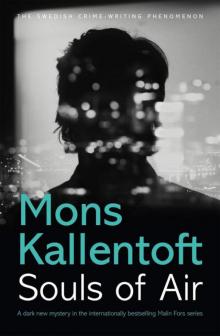 Souls of Air (Malin Fors 7)
Souls of Air (Malin Fors 7)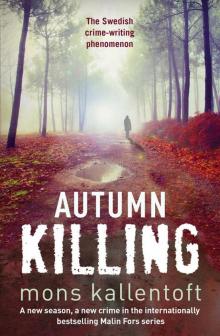 Autumn Killing dimf-3
Autumn Killing dimf-3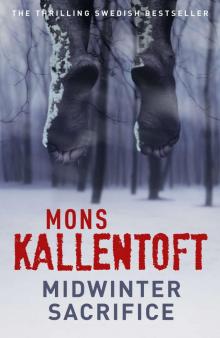 Midwinter Sacrifice
Midwinter Sacrifice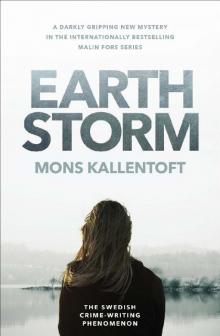 Earth Storm_The new novel from the Swedish crime-writing phenomenon_Malin Fors
Earth Storm_The new novel from the Swedish crime-writing phenomenon_Malin Fors Zack
Zack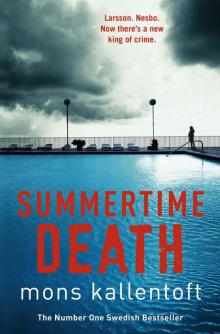 Summertime Death
Summertime Death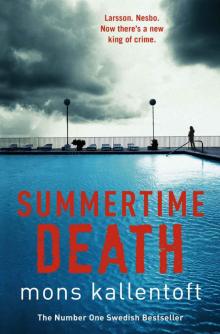 Summertime Death mf-2
Summertime Death mf-2